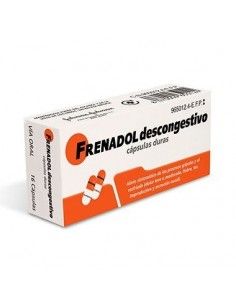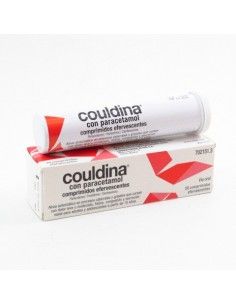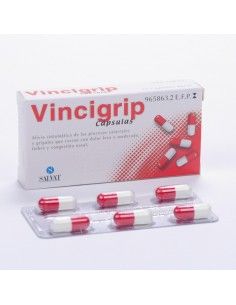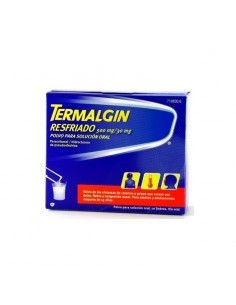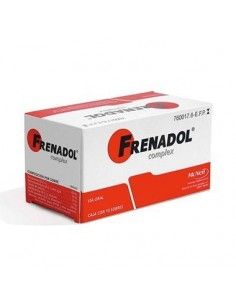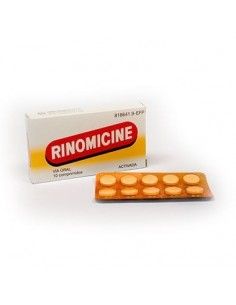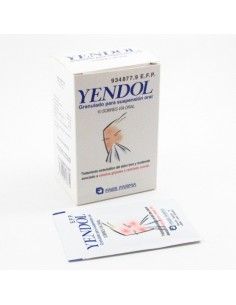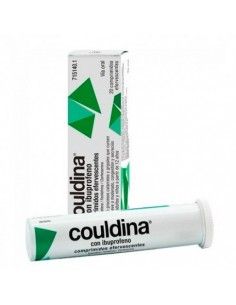Pharmagrip Forte Powder for Oral Suspension
Paracetamol / Phenylephrine Hydrochloride / Chlorphenamine Maleate
Read all of this leaflet carefully before you start taking this medicine because it contains important information for you.
Follow the instructions for taking this medicine exactly as described in this leaflet or as advised by your doctor or pharmacist.
-
Keep this leaflet, as you may need to read it again.
-
If you need advice or more information, consult your chemist.
-
If you experience adverse effects, consult your doctor or chemist, even if they are adverse effects not listed in this leaflet. See section 4.
-
You should consult a doctor if your condition worsens or does not improve, or if your fever persists for more than 3 days or your pain persists for more than 5 days (2 days for sore throat).
Contents of the leaflet:
-
What Pharmagrip Forte powder for oral suspension is and what it is used for.
-
What you need to know before you start taking Pharmagrip Forte powder for oral suspension.
-
How to take Pharmagrip Forte powder for oral suspension.
-
Possible side effects.
-
Storage of Pharmagrip Forte powder for oral suspension.
-
Contents of the pack and additional information.
1. What Pharmagrip Forte powder for oral suspension is and what it is used for
Pharmagrip forte powder for oral suspension is a combination of paracetamol (an analgesic that reduces pain and fever), chlorphenamine (an antihistamine that relieves nasal discharge) and phenylephrine (which acts by reducing nasal congestion).
This medicine is indicated for the relief of symptoms in colds or flu that cause pain (mild or moderate), fever, congestion and nasal discharge in adults and adolescents aged 14 years and older.
You should consult your doctor if your condition worsens or does not improve, or if your fever persists for more than 3 days or your pain persists for more than 5 days.
2. What you need to know before you start taking Pharmagrip Forte powder for oral suspension
Do not take Pharmagrip Forte powder for oral suspension
-
If you are allergic to paracetamol, phenylephrine, chlorphenamine or any of the other ingredients of this medicine (listed in section 6).
-
If you have high blood pressure (hypertension).
-
If you have thyroid disease (hyperthyroidism).
-
If you have severe liver or kidney disease.
-
If you have severe heart or artery disease (severe coronary artery disease or angina pectoris).
-
If you have diabetes mellitus.
-
If you have tachycardia (rapid heartbeat).
-
If you are being treated with any monoamine oxidase inhibitor (MAOI) medication (such as some antidepressants or medications to treat Parkinson's disease).
-
If you are being treated with sympathomimetic medications (medications used to treat asthma, or medications to increase heart rate).
-
If you are being treated with beta-blockers (medications for the heart or to treat arterial diseases (see: Taking pharmagrip forte powder for oral suspension with other medications).
-
If you suffer from glaucoma (increased eye pressure).
-
Children under 14 years of age cannot take this medication due to the paracetamol dose.
Warnings and precautions
Consult your doctor or pharmacist before starting to take pharmagrip forte powder for oral suspension.
The following patients should consult their doctor before taking this medicine:
-
Patients with kidney, liver, heart or lung disease and patients with anaemia.
-
Asthmatic patients who are sensitive to acetylsalicylic acid.
-
Patients who are sensitive (allergic) to an antihistamine, because they may be sensitive to other antihistamines (such as chlorphenamine).
-
Patients who are being treated with medicines for: prostate hypertrophy, bronchial asthma, very slow heartbeat, hypotension, cerebral arteriosclerosis, inflammation of the pancreas (pancreatitis), digestive ulcer (stenosing peptic ulcer), pyloroduodenal obstruction (between the stomach and intestine), anaemia, thyroid diseases, patients sensitive to the sedative effects of some medicines.
If you are being treated with tricyclic antidepressants or medications with a similar effect and you experience gastrointestinal problems, you should stop taking this medication and consult a doctor immediately, as you could develop paralytic ileus (cessation of normal movements in part of the intestine).
Chronic alcoholics should take care not to take more than 2 g (3 sachets) of paracetamol per day.
Do not take more than the recommended dose in section 3 (How to take pharmagrip forte powder for oral suspension).
The simultaneous use of this medicine with other medicines containing paracetamol should be avoided, as high doses can lead to liver damage. Do not use more than one medicine containing paracetamol without consulting your doctor.
Children
Due to the amount of paracetamol contained in this medicine, children under 14 years of age should not take this medicine.
Interference with analytical tests:
If you are going to have any analytical tests (including blood tests, urine tests, etc.), tell your doctor that you are taking/using this medicine, as it may alter the results.
Chlorphenamine may interfere with the results of allergy tests. If you are going to have any tests, it is recommended that you stop taking the medication at least 3 days beforehand.
Taking Pharmagrip Forte powder for oral suspension with other medicines
Tell your doctor or pharmacist if you are taking, have recently taken, or may have to take any other medicines.
In particular, if you are using any of the following medicines, as it may be necessary to modify the dose of some of them or to separate the administration by a minimum of 15 days or to interrupt the treatment:
-
Medicines to treat epilepsy: Antiepileptics (lamotrigine, phenytoin or other hydantoins, phenobarbital, methylphenobarbital, primidone, carbamazepine).
-
Medications to treat tuberculosis (isoniazid, rifampicin).
-
Medications to treat seizures and depression (barbiturates), used as hypnotics, sedatives and anticonvulsants.
-
Medications to prevent blood clots: Oral anticoagulants (acenocoumarol, warfarin).
-
Medicines used to increase urine output (loop diuretics such as those in the furosemide group, or other diuretics) and other diuretics that cause potassium loss (such as diuretics to treat high blood pressure or others).
-
Medicines used to prevent nausea and vomiting (metoclopramide and domperidone).
-
Medicines used to treat gout (probenecid and sulfinpyrazone).
-
Medicines used to treat high blood pressure (hypertension) and heart rhythm disturbances (cardiac arrhythmias) (propranolol).
-
Medicines to lower blood cholesterol levels (cholestyramine).
-
Medicines used to treat depression, Parkinson's disease or other diseases (monoamine oxidase inhibitors (MAOIs)). Pharmagrip forte powder for oral suspension should be taken at least 15 days after finishing treatment.
-
Medicines used to treat migraine; medicines taken for childbirth; medicines taken to treat high blood pressure or other diseases (alpha-adrenergic blocking medicines).
-
Alpha and beta-adrenergic blockers such as labetalol and carvedilol (used for the heart or to treat diseases of the arteries).
-
General anaesthetic medicines.
-
Antihypertensives (medications to lower blood pressure).
-
Medications used for the heart, such as cardiac glycosides and antiarrhythmics.
-
Medications containing thyroid hormones (used to treat thyroid diseases).
-
Medications used for heart diseases or digestive diseases (atropine sulphate).
-
Medicines that cause depression of the central nervous system (such as those used for insomnia or anxiety).
-
Ototoxic medicines (which have the adverse effect of damaging the ear).
-
Photosensitising medicines (which have the adverse effect of causing allergy to light).
Taking Pharmagrip Forte powder for oral suspension with food, drink and alcohol
While you are being treated with this medicine, you should not drink alcoholic beverages, as this may increase the adverse effects of this medicine.
In addition, the use of medicines containing paracetamol by patients who regularly consume alcohol (3 or more alcoholic drinks: beer, wine, spirits, etc. per day) can cause liver damage.
Chronic alcoholics should take care not to take more than 2 g of paracetamol (3 sachets per day) spread over several doses.
The medicine can be taken with or without food.
Pregnancy and breastfeeding
If you are pregnant or breastfeeding, think you may be pregnant or are planning to have a baby, ask your doctor or pharmacist for advice before taking this medicine.
This medicine should not be taken during pregnancy unless your doctor considers it strictly necessary.
This medicine should not be taken during breastfeeding, as it may cause adverse effects in the baby.
Driving and using machines
This medicine may cause drowsiness, so if this occurs, avoid driving or using machines.
Pharmagrip forte contains orange yellow S (E-110) and mannitol (E-421).
This medicine may cause allergic reactions because it contains orange yellow S (E-110). It may cause asthma, especially in patients allergic to acetylsalicylic acid.
It may have a mild laxative effect because it contains mannitol.
3. How to take Pharmagrip Forte powder for oral suspension
Follow the instructions for administering the medicine contained in this leaflet or those indicated by your doctor or pharmacist exactly. If in doubt, ask your doctor or pharmacist.
Dosage
-
Adults: The usual dose is 1 sachet every 6-8 hours (3-4 sachets per day). The maximum daily dose is 4 sachets in 24 hours.
-
Adolescents aged 14 years and over: The usual dose is 1 sachet every 6-8 hours (3-4 sachets per day).
Do not take more than 3 g of paracetamol (4 sachets) every 24 hours.
Patients with liver disease: in cases of liver failure, do not exceed 2 g of paracetamol (3 sachets per day) and the minimum interval between doses is 8 hours.
Patients with kidney disease: this medicine is not suitable for patients with renal impairment due to the paracetamol dose.
(See section 2 What you need to know before taking this medicine).
Use in children and adolescents under 14 years of age:
Children under 14 years of age cannot take this medicine due to the amount of paracetamol it contains.
Use in elderly people:
Elderly people should not use this medicine without consulting their doctor because they may be particularly affected by some of the adverse effects of the medicine, such as slow heartbeat (bradycardia) or reduced cardiac output, due to the phenylephrine and chlorphenamine content. They are also more likely to experience adverse effects such as dizziness, sedation, confusion, hypotension or agitation, and may be more sensitive to effects such as dry mouth and urinary retention.
Method of administration
-
This medicine is taken orally.
-
Pour the entire contents of the sachet into approximately half a glass of water.
-
Stir and drink.
Duration of treatment:
Taking this medicine is dependent on the appearance of symptoms. As these disappear, treatment should be discontinued.
If symptoms worsen, or if fever persists for more than 3 days of treatment, pain or other symptoms persist for more than 5 days, or new symptoms appear, you should consult your doctor.
If you take more Pharmagrip Forte powder for oral suspension than you should
If you have taken an overdose, you should go to a medical centre immediately, even if you do not notice any symptoms, as these often do not appear until 3 days after the overdose has been taken, even in cases of severe poisoning.
Symptoms of overdose may include:
-
Dizziness, vomiting, loss of appetite, yellowing of the skin and eyes (jaundice) and abdominal pain.
-
Anxiety, fear, agitation, headache (may be a symptom of high blood pressure), convulsions, insomnia (or intense drowsiness), clumsiness, feeling faint, instability, confusion, irritability, tremors, anorexia; psychosis with hallucinations (the latter especially in children).
-
Dry mouth, nose or throat.
-
Effects such as high blood pressure, arrhythmias (rapid or irregular heartbeat), palpitations, reduced urine output.
-
Metabolic acidosis (decrease in the alkaline reserve of the blood).
-
Prolonged use may lead to plasma volume depletion (decrease in blood volume).
Treatment of overdose is most effective if started within 4 hours of taking the overdose.
Patients undergoing treatment with barbiturates or chronic alcoholics may be more susceptible to the toxicity of a paracetamol overdose.
In case of overdose or accidental ingestion, go immediately to a medical centre or call the Toxicology Information Service on 915 620 420, indicating the medicine and the amount ingested.
4. Possible side effects
Like all medicines, this medicine can cause side effects, although not everybody gets them.
During the period of use of paracetamol, phenylephrine and chlorphenamine, the following side effects have been reported, the frequency of which has not been accurately established:
5. Contents of the pack and additional information
Composition of pharmagrip forte powder for oral suspension
-
The active ingredients are: paracetamol 650 mg, phenylephrine hydrochloride 10 mg (equivalent to 8.21 mg of phenylephrine) and chlorphenamine maleate 4 mg (equivalent to 2.8 mg of chlorphenamine).
-
The other ingredients are: sodium saccharin, sodium cyclamate, mannitol (E-421), orange flavouring, orange yellow S colouring (E-110) and povidone.
Appearance of the product and contents of the pack
-
Pharmagrip forte powder for oral suspension is supplied in sachets. Each sachet contains 4 g of powder.
-
Pharmagrip forte powder for oral suspension is supplied in packs containing 10 sachets.








